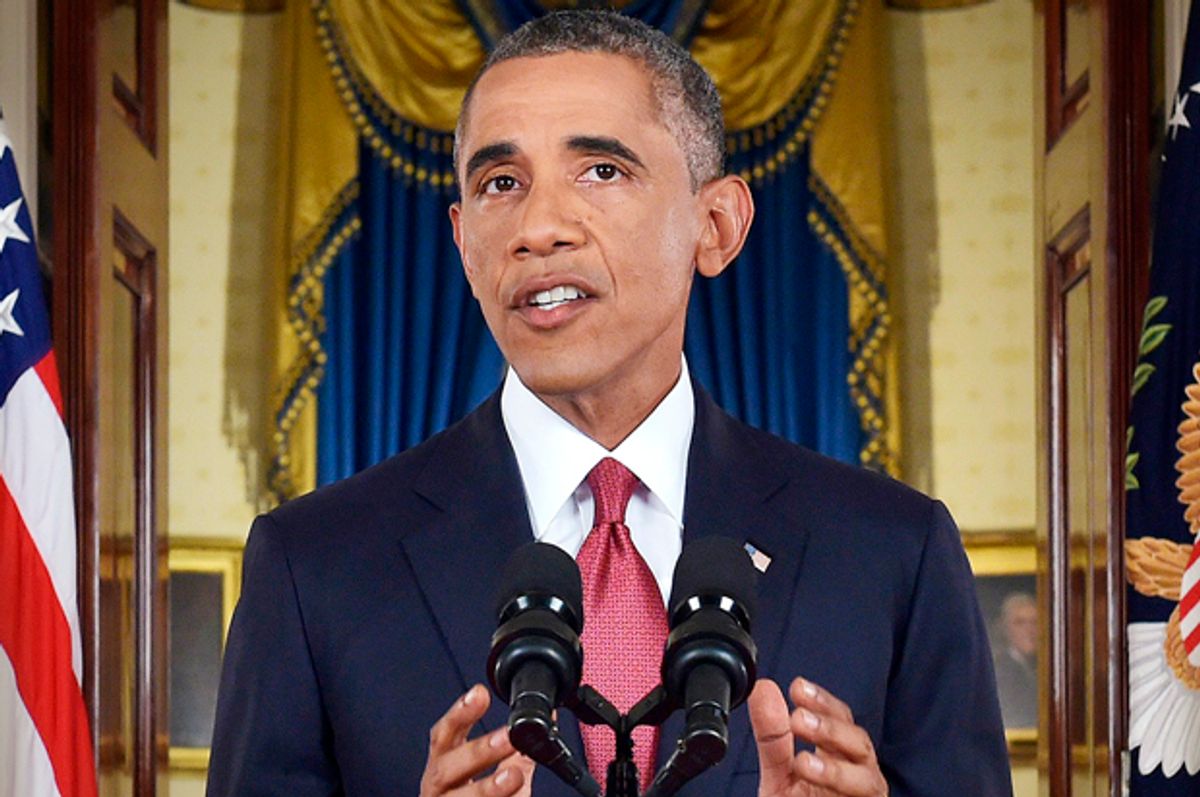Much to the satisfaction of impatient hawks everywhere who actually won't be satisfied and will remain impatient, President Obama laid out his strategy for "destroying ISIS" in a prime-time speech last night. We know this because he said, "This is our strategy."
The strategy itself hewed to the contours of leaks to news outlets earlier this week: airstrikes targeting ISIS in both Iraq and Syria, support for political reconciliation led by the new government in Iraq, training and arming Kurdish forces in Iraq and "the opposition" in Syria, and building a coalition of Arab states to support our endeavors. America would provide muscle and resources, but ultimately the completion of "destroying" ISIS would rest on the ability of local forces to drive things home.
That's the military and diplomatic strategy. The political strategy, however, seems to be more about appeasing all stakeholders. We will "destroy" ISIS, but it won't be a war, it will be "counter-terrorism." It won't be a unilateral assault, it will be "a strategy of taking out terrorists who threaten us, while supporting partners on the front lines ... one that we have successfully pursued in Yemen and Somalia for years." The administration won't seek strict congressional authorization for new military action in Iraq and Syria, but it will "welcome congressional support for this effort in order to show the world that Americans are united in confronting this danger" -- in other words, Congress can pass the bucks to arm and train the Syrian "opposition." And while the U.S. intelligence community has not "detected specific plotting against our homeland, it "believes that thousands of foreigners – including Europeans and some Americans – have joined them in Syria and Iraq. Trained and battle-hardened, these fighters could try to return to their home countries and carry out deadly attacks."
So: We'll quench the thirst for bomb-dropping but it will only be "counter-terrorism"; we won't be invading so much as assisting partners; Congress won't authorize but will hold a vote, on at least something; ISIS doesn't represent an immediate threat to the homeland now, but it could, later, when these Americans who've joined ISIS repatriate to carry out their deadliest of missions.
And so the political strategy is to throw a chunk of bread at everyone. What's most worrisome for the administration, though, is the expectations it's set up for itself by adopting the goal of "destroying" ISIS. (Obama does take care to hedge this, at least, with the qualifier "ultimately." As in, if ISIS is still around when his term is over -- which of course it will be -- his lucky successor will get to finish it off.)
It's the comparisons to the actions in Yemen and Somalia that are the most curious. The government used to try to keep those actions on the down-low, but yes, intermittent strikes on terrorist groups in those countries have been occurring for years. Those groups have hardly been "destroyed," and the states in which they reside remain more or less chaotic and failed. So Yemen and Somalia are a difficult model for what he intends to do with Syria and Iraq -- eliminate the threat, ultimately, by helping to create stable, functioning regimes in those countries.
At least in Yemen and Somalia there are nominal governments -- whatever shambles they're in -- that are asking us to be there. The same could be said about Iraq. The Iraq government points, we shoot from the sky. That's why the haziest part of the plan is Syria.
We do not have a government with which to partner in Syria. In fact the official position of the United States is that the Assad regime must go. Remember when just a year ago we were going to bomb Syrian government targets? All of these competing interests come together in the most jumbled section of the speech:
Across the border, in Syria, we have ramped up our military assistance to the Syrian opposition. Tonight, I again call on Congress to give us additional authorities and resources to train and equip these fighters. In the fight against ISIL, we cannot rely on an Assad regime that terrorizes its people; a regime that will never regain the legitimacy it has lost. Instead, we must strengthen the opposition as the best counterweight to extremists like ISIL, while pursuing the political solution necessary to solve Syria’s crisis once and for all.
So: destroy ISIS in Syria, but don't partner with ISIS' common enemy in Assad, because he's a jerk and we have to maintain our pride, and so given money and arms to the decent non-ISIS opposition people so they can help us kill the ISIS baddies and also, too, reach the political solution that ends turmoil in Syria, which means getting Assad to step aside even though he'll be strengthened by the degradation of ISIS.
Well, it's a strategy. How could anything go wrong?

Shares